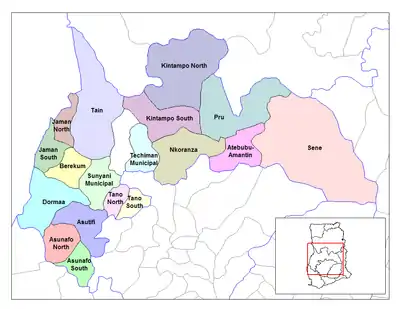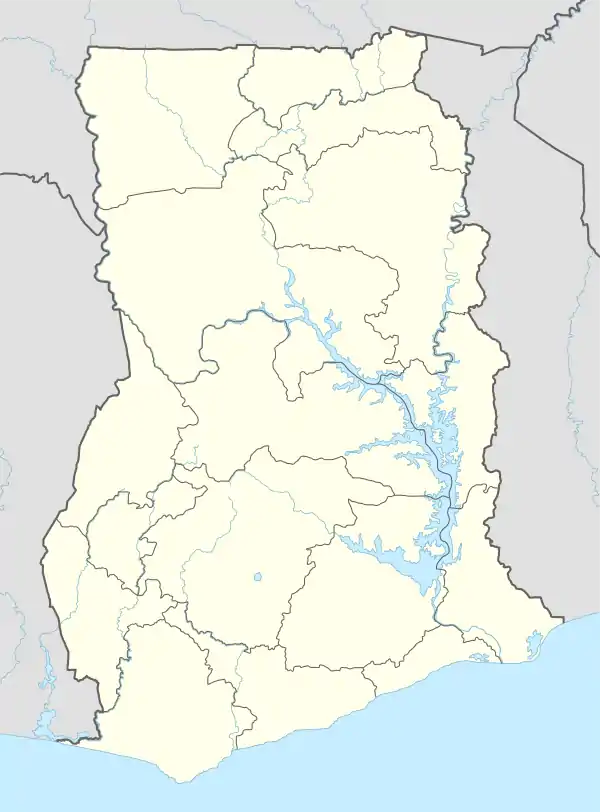Jaman North District
Jaman North District is one of the twelve districts in Bono Region, Ghana.[2] It was originally part of the then-larger Jaman District on March 10, 1989 after being created from the former Berekum-Jaman District within the then-larger Brong-Ahafo Region. Later on, it was split off in 2004 from Jaman South District to become Jaman North District under the Legislative Instrument (LI) 1779. The district assembly is located in the western part of Bono Region and has Sampa as its capital town.
Jaman North District
Jaman Nord | |
|---|---|
District | |
 Location of Jaman North District in Bono Region | |
 Jaman North District Location of Jaman North District in Bono Region | |
| Coordinates: 7.9505°N 2.6978°W | |
| Country | Ghana |
| Region | |
| Capital | Sampa |
| Government | |
| • Type | Municipal Assembly |
| • Municipal Executive | Adane Ankomah |
| Population | |
| • Total | 102,758 [1] |
| Time zone | UTC+0 (Greenwich Mean Time) |
| • Summer (DST) | GMT |
It is located between latitude 7O 40’ N and 8O 27’N, and longitude 2O 30’W and 2O 60’W. The district is located in the Western part of the Bono Region and to the North Western fringes of the neighboring Ivory Coast country. It borders Tain District to the north through to the eastern part of the district, Jaman South Municipal to the southwest and Berekum Municipal to the southeast. The location of the district along the Ghana and Ivory Coast border presents economic potential and opportunities that can be maximized to improve the lives of the citizenry.
Population
According to the 2010 population and housing census, the total population of the district is 83,059 with a population growth rate of 2.25% as that of the region and is composed of 48.1% males and 51.9% females with about 52.5% of the population living in urban areas and 47.5% living in the rural areas.
Economy
The employment rate in the district is about 78% of the active labour force. The above figure puts the unemployment rate in the district at 22%. However, the unemployment rate in the region is about 34% which is higher than the district's rate of 22%. The major economic activities of the district fall under agriculture, forestry and commerce which employ about 72% of the active labour force in the district. Service and industrial sectors employ about 8.1% and 19.9% of the labour force, respectively.
Agriculture
Agriculture is the dominant economic activity in the Municipality. It employs more than 70% of the total population within the labour force. Thus it is the major source of livelihood for majority of people in the District. The major sectors of agriculture in the district are crop farming and livestock rearing.
Education
The district has seventy-five schools: fifty-six public and nineteen private, with 99 classrooms. Total KG enrolment is 5,917 with 4,695 enrolled in the public schools. The male and female figures are; 2,244 and 2,451 respectively. Total enrolment at the primary level is 14,006 comprising 7,159 males and 6,901 females. At the Senior High level, there are eight Senior High and Technical Schools.
Health
Both orthodox and traditional health services are provided in the Municipality which focuses on curative and preventive care delivery. The health needs of the population are catered for by the Sampa government Hospital, Fountain Care Hospital, the six sub-districts health centres and over thirty-three chemical shops.
History
Jaman North Municipal was split off the former Jaman District (which has since been called Jaman South Municipal) on November 12, 2003.
List of major settlements
| Settlements of Jaman North Municipal | |||
| Settlement | Population | Population year | |
|---|---|---|---|
| Duadaso | |||
| Goka | |||
| Kokoa | |||
| Sampa | |||
| Suma-Ahenkro | |||
| Bonakire | |||
| Kabile | |||
| Old Drobo | |||
| Seketia | |||
| Nsonsonmea | |||
References
- https://statsghana.gov.gh/regionalpopulation.php?population=MTMxOTU3MTAxOC44MjU=&&Bono®id=2
- "Brong Ahafo to be known as Bono Region". Graphic Online. Retrieved 2020-08-13.
Sources
- "Jaman North District". Statoids.
- District: Jaman North
- 19 New Districts Created, November 20, 2003.